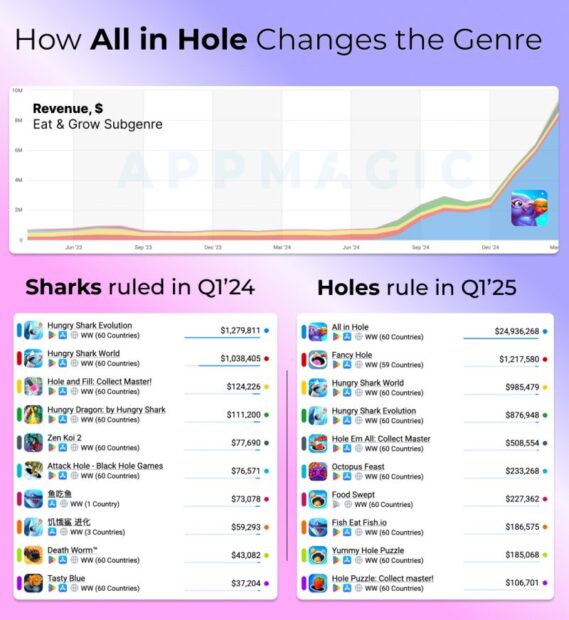
Beyond 2023: What to expect in 2024
Journal 35 Saikat Mondal January 29
TWIG #263 The DOF Game Industry Awards (Listen on Spotify)
AI’s Transformative Role in Gaming (DOF Spotify 5:30)
-
Development and Marketing Impact: AI’s influence on game development and marketing costs is a central topic, with diverse perspectives on its potential.
-
Industry Shift Indicator: King’s acquisition of Peltarion highlights AI’s significant impact, signaling a major industry transition.
Major Industry Movements
-
Microsoft-Activision Acquisition: A pivotal event, marked as one of the biggest acquisitions in gaming history.
-
Unity’s Controversial Fee: Caused speculation and trust issues in an engine powering 70% of mobile games.
-
Off-Platform Payments: Notably, Playtika’s off-platform revenues account for 30%, and Huuuge Games shows rapid growth in this area. (previous DOF podcast summary detailed analysis on Webshops)
Unlocking New Demographics in Console Gaming
-
Harry Potter Hogwarts Legacy’s Success: Contrary to expectations, the game sold around 16-17 million units, broadening the console market to include more women and children.
Opportunities and Challenges in the Indian Market (DOF Spotify 15:15)
-
Big Player Advantage: India’s real-time payment systems, like UPI, are creating significant opportunities, particularly for larger companies.
Rising Importance of Web Shops and Offline Payments (DOF Spotify 15:40)
-
Industry Impact: The focus on web shops is reshaping strategies for user acquisition and revenue generation (link for more detailed analysis).
Questionable Industry Predictions (DOF Spotify 17:15)
-
Speculative IPOs and Market Impact: Doubts about predictions like Supercell’s IPO and Farley 84’s failed success in the West.
-
Overestimated Tech Influence: Initial expectations for Apple Vision Pro’s impact on AR/VR, priced at an estimated $4000, were premature.
Challenged Segments and Companies (DOF Spotify 20:00)
-
Forte’s Transparency Issues: Despite raising $910 million, including $725 million in 2021, concerns persist about its role in Web3.
-
Google’s Legal Hurdle: The antitrust lawsuit outcome could transform the app store ecosystem.
-
Extraction Shooter Investments: Rapid but questionable VC investments reflect the industry’s fickleness.
-
Mobile Shooter Genre Decline: A significant 50% revenue decline in the US market.
-
Embracer’s Acquisition Strategy: Questioned for its lack of efficiency and centralized management.
Gaming Industry’s Growth Trajectory
-
Expected Revenue Growth: Predicted to reach $268 billion by 2025.
-
Adaptation Necessity: Emphasizing the need for companies to evolve with market and consumer trends.
2023 Game launches underperformers and good small titles (DOF Spotify 34:00)
-
Noteworthy Underperformers: Titles like Forspoken, Starfield, Total War: Pharaoh, Red Fall, and Halo Infinite failed to meet expectations.
-
Appreciated Smaller Titles: North Guard, Bad North, Pikmin 4, Final Fantasy XVI, and Match Factory received positive mentions.
Strategic wins in the Industry (DOF Spotify 49:30)
-
Notable Acquisitions and Launches: Scopely’s acquisition, EA’s ‘FC’ brand launch, and Epic’s Fortnite innovations.
-
Sony’s Profitable Steam Ventures: Horizon Zero Dawn sold approximately 3.3 to 4 million units on PC, demonstrating cross-platform success and highest ROI move to utilize existing IPs.
Start writing today. Use the button below to create your Substack and connect your publication with Saikat’s Substack
Skeptical moves in 2023
-
Netflix’s Gaming Strategy: Over 40 launches and 90 games in development, but the focus on quantity over quality (shotgun approach) raises concerns.
-
Social Media Giants’ Gaming Exit: Snap (in early Jan) and Bytedance’s recent shift away from gaming viewed as a potential misstep. Immense potential to unlock social media and gaming synergies underexploited.
-
Disney’s Web 3 Venture: Dapper Labs to introduce digital pins in partnership with Dapper Labs raises questions about strategic alignment.
-
Supercell’s Rapid Expansion: Increasing headcount, with concerns over its impact on studio culture.
2023’s Notable Industry Layoffs
-
Widespread Layoffs: Over 11,000 layoffs including in major companies like Embracer, Epic, EA, Ubisoft, and Unity.
Creative and Commercial Successes (DOF Spotify 1:02:00)
-
High-Revenue Achievers: TikTok’s app purchases exceed $10 billion lifetime (with $4 Mn USD just in 2023), Monopoly Go’s $1 billion in less than a year, and Harry Potter’s 20 million units sold in 2023.
-
Enduring and Innovative Games: Candy Crush’s continued global revenue dominance (excl. China) and Baldur’s Gate’s impressive sales (10-15 million units, $400-500 million in revenue).
-
Free-to-Play Success: Naraka Blade Point’s successful transition to a free-to-play model led to a surge from 1 million to 2 million DAUs.
Our Games industry predictions 2024 (Naavik roundtable listen on Spotify)
ESRB Rating and Web 3 Games (Naavik Spotify 2:00)
-
Gods Unchained’s Adult Rating: Received an adults-only rating from ESRB due to its integration of NFTs. Epic Games Store has carved out an exception to support Web3 games with such ratings.
Console Market Innovations (Naavik Spotify 3:00)
-
Nintendo’s Focused Approach:
-
Handheld Strategy: Commitment to handheld gaming with a projected Nintendo Switch 2 launch in 2025.
-
Quality and Fidelity: Aims to compete with Xbox and PlayStation in terms of game quality.
-
Partnerships: A 10-year contract with Microsoft to include Call of Duty games, indicating a new openness to big publishers and indie games.
-
-
Sony’s Ecosystem Challenges:
-
Walled garden approach: Focusing on a walled garden approach with products like PlayStation and PSVR2, which sold 600k units, falling short of expectations.
-
Cloud Gaming and Handhelds: Sony’s less defined strategy in cloud gaming compared to Microsoft and Nintendo, with future directions in these areas still uncertain.
-
-
Microsoft’s Cross-Platform Strategy:
-
Open ecosystem push: Seeking to reach gamers across various platforms, including partnerships with entities like Meta Quest establishes Microsoft as a key player where they can expand the overall player base on mobile, console and PC.
-
-
Meta’s Oculus Ambitions:
-
Viewed as Limited: Facing challenges in hardware and form factor, indicating a need for improvements in partnerships and VR quality.
-
Subscription Gaming Landscape (Naavik Spotify 19:54)
-
Industry Shift: Increasing emphasis on subscription-based models offering a variety of high-quality games.
-
Key Players:
-
Xbox Game Pass: Expanding with top-tier titles and considering tiered pricing, mobile store (anticipated), including an ad-supported option.
-
Netflix’s Gaming Foray: Utilizing its platform to promote games, benefitting from the rise in mobile phone quality.
-
Apple Arcade vs Netflix: Apple Arcade focuses on retention, while Netflix aggressively expands its gaming catalog.
-
Advancements in Mobile Gaming
-
Technological Leap with A7 Pro Chip: Promises a 20% improvement over the A16 chip, paving the way for enhanced mobile gaming experiences.
-
Cloud Gaming’s Mobile Potential: The shutdown of Google Stadia earlier notwithstanding, its technology could be pivotal for streaming mobile games.
AI’s Role in Game Development (Naavik Spotify 32:29)
-
Broad Impact: AI is revolutionizing game development, from creating assets to optimizing advertisements.
-
Ethical and Rights Concerns: Raises questions about job roles, creativity, and ownership of AI-generated assets creates problems for larger platform like Steam to launch new native AI games.
User-Generated Content (UGC) Platforms (Naavik Spotify 46:00)
-
Fortnite’s User Trends:
-
MAU Fluctuations: Dropped from 275 million in Dec 2021 to 231 million recently in the last 30 days. Players spiked post the launch of Lego, Rocket League and Music Games.
-
Monetization and User Acquisition: Challenges in building experiences on Fortnite, similar to hyper-casual game focusing on core loops that interests users now. Developers expect to figure the games and experiences that work best to create more meaningful content in future.
-
-
Roblox’s Strong Position:
-
DAU and Revenue: Boasting over 65 million DAUs and over 110 developers earning more than $1 million each year.
-
Developer Ecosystem: Housing 4.2 million developers but presenting challenges in substantial income generation.
-
Gaming Investment Trends
-
VC Investment Declines: A notable 50% decrease in VC seed round investments with investments shifting from content to technology.
-
Market Fluctuations: Diverse strategies from companies like EA focusing on first party IPs and Tencent pausing their investment.
Mobile Gaming’s Future Outlook – challenges and opportunities: (Naavik Spotify 1:01:00)
-
Privacy and Competition Issues: Affecting strategies in user acquisition and monetization (link for more details). Epic vs. Google likely to promote off-platform payments (incl. web shops and instant payments link for more details here)
-
Focus on Quality and Engagement: Emphasis on developing games with deep engagement and monetization designs.
-
Graphics vs. Gameplay in 2024: The increasing importance of console-quality graphics. However, gameplay and content remain critical for success.







